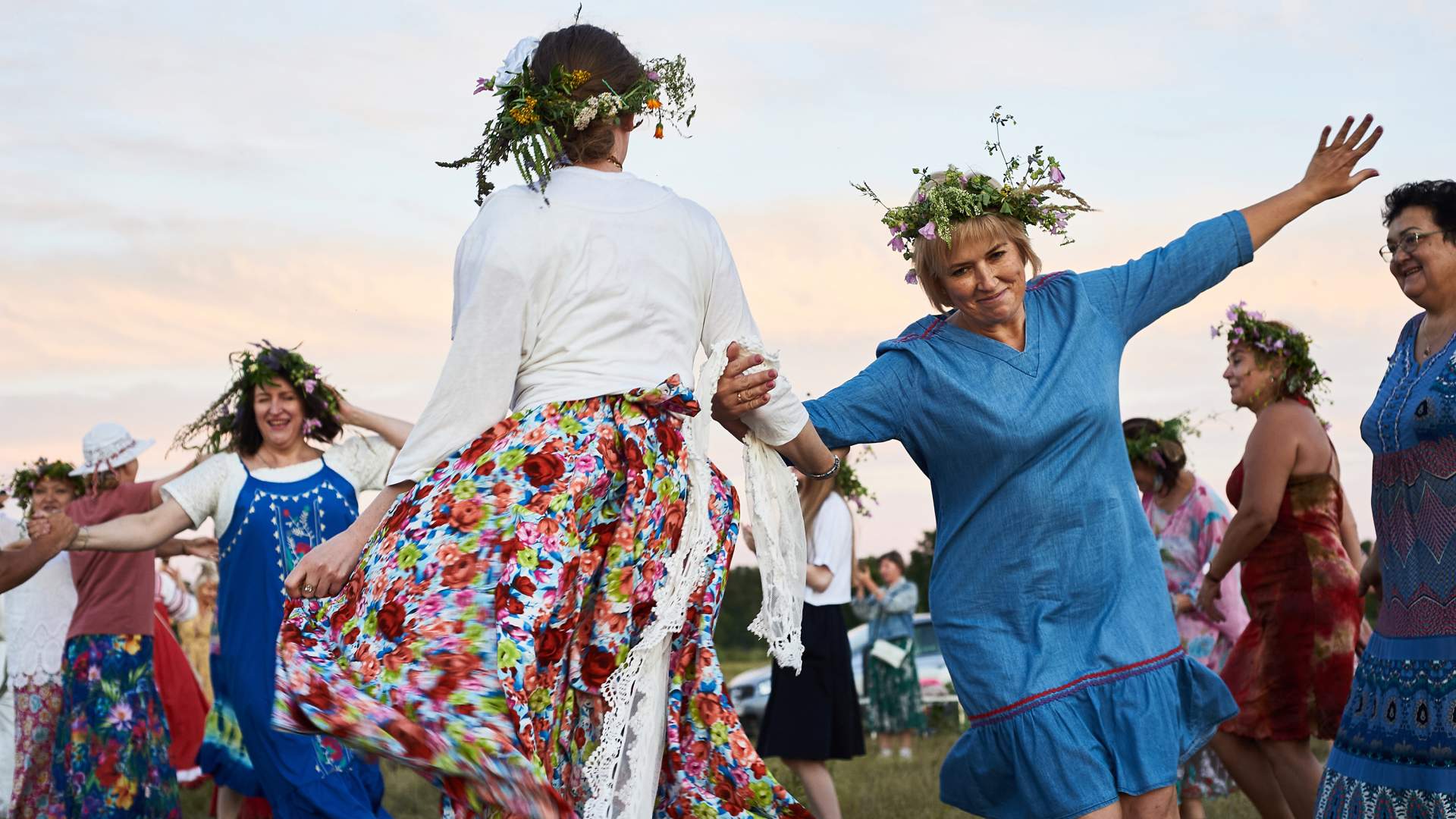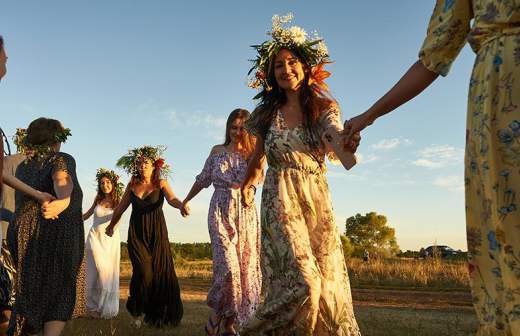Ivan Kupala in 2025: what date, magical rituals

The feast of Ivan Kupala is one of the most vivid and ancient folk celebrations, in which pagan rituals and Christian traditions are intertwined. Its roots go back to the time of the ancient Slavs, for whom this day symbolized the peak of the summer solstice and the flowering of wildlife. On the night of Ivan Kupala, people traditionally dipped into the water to cleanse themselves of their sins, and then jumped over bonfires, thus calling happiness and love into their lives. For more information about how the holiday originated and how Ivan Kupala will be celebrated in Russia in 2025, see the Izvestia article.
Ivan Kupala: the history, meaning and time of the holiday
The origin of the feast of Ivan Kupala dates back to the time of paganism, but exactly when it appeared is still unknown. According to one version, on the date of the celebration, the eastern and Western Slavs celebrated another holiday — the Day of the Summer Solstice. It was dedicated to a deity named Kupala, who was revered as the patron saint of fertility, warmth and the summer sun.
Some researchers of Slavic culture believe that the name of the summer deity reflects the main rituals of the holiday. Pagans on this day necessarily performed ablution in reservoirs and baths, and also jumped over a bonfire, thereby cleansing themselves of sins and protecting their family from diseases and misfortune.
The name Ivan appeared in the name of the holiday after the Baptism of Rus. At that time, all pagan traditions were undergoing serious transformations. Initially, the priests tried to replace the national holiday with the Nativity of John (Ivan) the Baptist, since the customs and rituals of the pagan celebration contradicted Christian canons. In Orthodoxy, St. John the Baptist is also called the Forerunner ("forerunner"), because he was the first to predict the imminent arrival of the Savior on earth, and then baptized Christ in the Jordan.

For Christians, the Nativity of John the Baptist has a special significance, so the Christian celebration was supposed to replace the pagan holiday. However, it was not possible to eradicate the traditions that had been established for centuries, and the holiday became known as Ivan Kupala, combining pagan and Christian principles.
When Russia switched to the Julian calendar, the date of the holiday ceased to coincide with the summer solstice. Since then, Ivan Kupala has been celebrated annually on July 7, and the astronomical event falls on June 20 or 21.
Ivan Kupala: traditions, prohibitions and folk signs
Many pagan traditions on Ivan Kupala were associated with the natural element, as the ancestors believed that holding rituals and rituals on certain holidays helps them to protect their lives from adversity.
It is believed that on the night of Ivan Kupala, two opposing elements come into harmony — fire and water, which on this day have a special magical power. Therefore, it is customary to start a festive morning with washing with morning dew, which gives youth and beauty on Ivan Kupala. During the day, you should plunge into any body of water to wash off all the hardships and protect yourself from evil spirits.
There is a tradition of jumping over ritual bonfires in the evening. Girls do this to keep their attractiveness and protect themselves from diseases, while boys do it to attract good luck and prosperity into their lives. But more often than not, lovers jump over the campfire. Pagan tradition says that if a young couple holds hands and jumps over a festive fire, they will be inseparable for a century. It is also believed that the fire on Ivan Kupala is able to heal from the evil eye and bad luck.
Wildflowers and herbs were also attributed magical powers on this day. Therefore, on the night of Ivan Kupala, all the women went to collect flowers and herbs. Wreaths and amulets against evil spirits were woven from them, as well as decoctions were prepared, which were given healing properties. In addition, herbs were used for harvesting bath brooms. It was believed that massage with such a broom helps to rid a person of any ailment.
Almost all pagan rituals performed by the ancestors on this day were designed to drive away evil spirits and ensure happiness and longevity for those who participate in them.
The Russian Orthodox Church recalled that the feast of Ivan Kupala coincides with Orthodox lent. Therefore, believers are not allowed to have feasts and drink alcohol on this day. Fish, fruits, berries, vegetable dishes, porridges, lean pies and soups are allowed on the festive table.
In addition to pagan traditions, there were certain prohibitions on Ivan Kupala. It was believed that the money found on the day of the celebration would bring misfortune to the finder, so it is better to avoid a dropped purse, bill or coin lying on the ground or return it to the owner. In addition, the Slavs believed that it was impossible to sleep on this festive night. Currently, almost no one observes this ban.
On the day of the celebration, there were also many folk traditions related to marriage, health and the weather. The ancestors believed that the further a wreath floated down the river on that day, the happier its owner would be. Whose candle, inserted into the wreath, will burn out longer than others, she will have the longest life. And if the wreath is unwound, you don't have to wait for marriage this year. The wreath sank — to troubles, sorrows and illnesses.
The rain on Midsummer's Day meant that in seven days the heat would begin, which would last until the end of summer. The heavy dew on the day of the holiday foreshadowed a rich harvest of cucumbers. The clear starry sky promised a lot of mushrooms in the coming autumn. And if there was a thunderstorm on Ivan Kupala, there was no need to expect a harvest of nuts this year. Anyone who hears a cuckoo crowing on the day of the holiday will be attracted by the cold autumn. And the singing of a cricket on Ivan Kupala promised a mild and snowy winter.
How will Ivan Kupala be celebrated in 2025
In 2025, the feast of Ivan Kupala is traditionally celebrated on July 7. In honor of the celebration, various events will be held throughout Russia, combining folk rituals with modern cultural formats. Despite the fact that the holiday has deep pagan roots, today it is perceived as a vibrant summer event that attracts the attention of both lovers of traditions and those who are looking for unusual experiences.
In many regions, mass celebrations with bonfires, songs and dances are organized. On the evening of July 6 and 7, hundreds of people gather on the banks of rivers, lakes and ponds to jump through fire together — a symbol of purification and attracting good luck. Festivals with folk crafts, workshops on weaving wreaths from herbs and flowers, as well as contests for the best wreath and costume in the style of Slavic customs are held in the cities.
Special attention is paid to the ecological component of the holiday: many organizers urge participants to take care of nature, not to leave garbage after the festivities and use natural materials for wreaths and decorations. In some places, actions are carried out to clean the shores of reservoirs, which harmoniously combines with the tradition of ablution and respect for water.
The Orthodox Church reminds believers that Ivan Kupala coincides with the period of Peter the Great's fast, and recommends limiting the consumption of meat, dairy products and eggs, as well as abstaining from alcohol. Special divine services dedicated to John the Baptist will be held in churches on this day, as well as educational talks about the significance of the holiday in the Christian tradition.
Переведено сервисом «Яндекс Переводчик»


